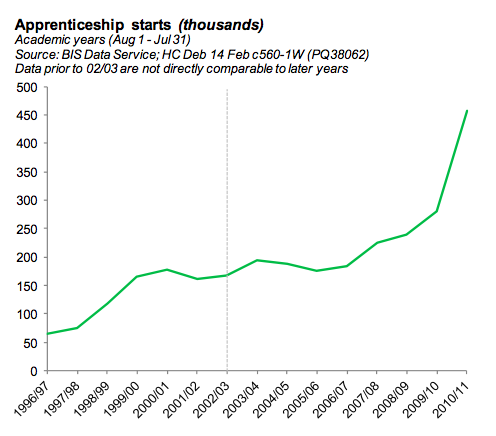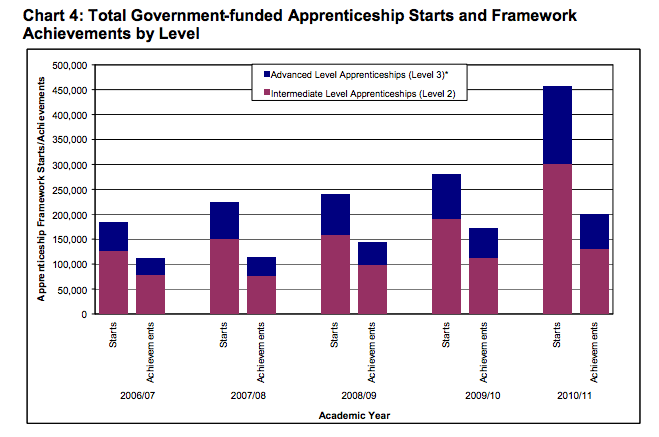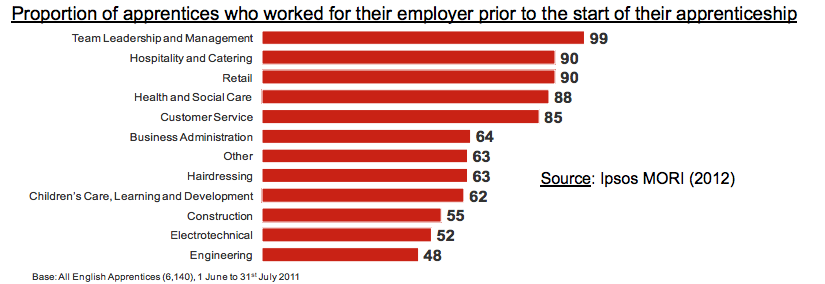Have apprenticeships been a Coalition success story?
"Since we brought in our changes, over the past two academic years more than 950,000 apprenticeships have been offered by over 100,000 different employers. On top of that, the youth contract offers 160,000 wage incentives for those who wish to start apprenticeships. Therefore, the scheme has been a major success for this Government. The coalition has done far more than the previous Government."
Iain Duncan Smith, House of Commons debate, November 5, 2012
In 2005 the unemployment rate (as reported by the Labour Force Survey) for those aged 16—17 was 22.4 per cent; 10.9 per cent for those aged 18—24. This prompted the Labour government of the day to revive apprenticeships as a way to get young people into work.
With youth unemployment continuing to be a thorn in the side of the economy, apprenticeship take-up has continued to be used as a means of measuring the success of the Government's response. As of August 2012, 35.5 per cent of those aged 16-17 and 18.5 per cent of those aged 18-24 were unemployed.
So what is the apprenticeship scheme?
Everyone over the age of 16 and not in full-time education or work is eligible to apply for apprenticeships. They're paid jobs that incorporate on- and off-the-job training. Upon completion of their contract, the apprentices are awarded a nationally-recognised qualification.
Following their revival in 2006, 184,400 people were employed by apprenticeships. Though apprenticeships have always existed, we can see that growth in that past six years has been historically quite significant, as shown in the graph below:

This next graph shows us that despite the rapid increase in the number of people starting apprenticeships, the number of completed apprenticeships has risen more modestly.

(Source: Department for Business, Innovation and Skills Statistical First Release)
Jessie Evans - lead statistician on the report - says the reason for the difference is very straightforward:
"We shouldn't compare the people starting apprenticeships in, say, 2010/11 with those completing them in the same year because, quite simply, they're not the same people."
The time it takes to complete an apprenticeship varies, and in many cases it could take well over a year. So, in this aspect, it's too soon to assess the success rate of apprenticeships.
Apprenticeships Now
502,500 people began apprenticeships this year. If you add them to the 457,200 which started on the scheme in year after the Coalition's electoral win (according to BIS) you do indeed have over 950,000 as Iain Duncan Smith claimed in Parliament on Monday.
What is behind this surge in apprenticeship starts?
Iain Duncan Smith can certainly point to a large increase in apprenticeship starts in the year after the Coalition took office. But what is driving this trend?
A closer look at the data shows that there has been a large expansion in the number of over 25s beginning apprenticeships, after the scheme was expanded to include this age group by the Labour Government in 2009.
Between 2009/10 and 2010/11, apprenticeship numbers for over 25s grew by 270% (from 49,100 to 182,100) - much higher than the rate of growth in other categories, such as for 19 to 24-year-olds (26% - from 113,800 to 143,400) and for 16 to 18-year-olds (12.7% - from 116,800 to 131,700). By all accounts, apprenticeships have been a success, but this success has not been equally distributed.
So has the Coalition done 'far more' than the previous government?
While it could be argued that the recent growth owes much to the previous Government's decision to expand the scheme to over 25 year olds, the current Government have nevertheless applied a number of changes, such as:
1. A Minister of State for Apprenticeships (16—18) and Careers Advice;
2. A £25 million "Higher Apprenticeships Fund" which adds to an overall budget of £2 billion;
3. A minimum length for all apprenticeships of between 6 and 12 months.
4. Apprenticeship training agencies, i.e. organisations which directly employ apprentices.
What impact has this had? There have been some attempts to measure this. In their report "Rethinking Apprenticeships" the Institute for Public Policy Research suggests that some companies may be shifting their employees onto apprenticeships in order to access this Government funding. This claim is backed up by official figures.
According to the Richard review of apprenticeships (see page 13) commissioned by the BIS, 70% of apprentices worked for their employer prior to starting their apprenticeship.

In conclusion, while we can certainly trace a rise in the number of apprenticeships since the coalition took power, the reasons behind the rise are seemingly down to policies implemented by both the coalition as well as the previous Government.
---
Flickr image courtesy of s_falkow